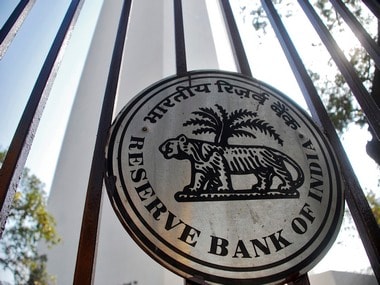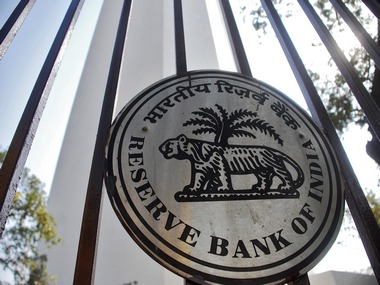Hitherto Indian companies had access to foreign borrowings chiefly through External Commercial Borrowings (ECB) denominated principally in US dollars and with just a sprinkling of Euro and Samurai bonds.[caption id=“attachment_2286186” align=“alignleft” width=“380”]
 The RBI logo. Reuters[/caption] There are two routes—automatic and approval. At present an Indian company among others can raise upto $700 million per annum under the automatic route i.e. in conformity with the RBI’s ECB guidelines, the principal restriction thereunder being cost of borrowing cannot exceed six-month LIBOR plus 350 basis points for borrowings from three to five years and plus 500 basis points for borrowings for maturities beyond five years. ECB has been a great hit with Indian companies because the interest rate abroad often works out to half of the Indian cost of borrowings but the downside is the foreign exchange rate fluctuation which more than neutralizes the cost of borrowings advantage in majority of cases especially given the fact that as per RBI’s own statistics, as much as 60 percent of ECBs are blithely unhedged. ECB suits companies like Reliance Industries Ltd that enjoy natural hedge advantage–you service the debt obligations in US dollars with the export proceeds in the same US dollars. Masala bonds shift the exchange rate risks onto the lenders, with all other features of ECB staying intact. The RBI has mandated that the interest rate on masala bonds cannot exceed the sovereign borrowing rate of the Indian government by more than 500 basis points i.e. 5 percent per annum. The first masala bond was issued by International Finance Corporation in November 2014. It mobilized Rs 1,000 crore equivalent to $163 million those days. What RBI now proposes to do is to allow masala bonds to be issued by Indian companies among others as well. This should be a boon to them because it would as said earlier shift the exchange rate risk to the lenders who of course would be serviced in a hard currency but at the prevailing exchange rate. Needless to say the foreign subscribers to masala bonds would factor in this risk while negotiating the interest rate. In case of ECB, top-notch Indian companies have been getting away with lesser interest vis-à-vis lesser companies but masala bonds are a different kettle of fish – the exchange rate risk is more pronounced than credit risk so much so that there may not be a marked difference in the cost of borrowing between top notch Indian companies and lesser ones. Nevertheless, RBI has done well to open up masala bonds for the Indian business community in general. It is a yet another calibrated move in the direction of capital account convertibility. Listing in London Stock Exchange of such bonds as done by IFC would provide a very good benchmark for yields for the rather weak market for bonds in India. Therefore there are chances that not only the market for bonds in India would grow but would in addition reflect the international conditions especially when the overall size of masala bonds becomes a hefty chunk of the total borrowings in India. In other words the masala bond market may come to exert a healthy influence on cost of borrowings in India thanks to the integration with the international financial market. It can be expected that Indian companies wanting to play safe and not having the natural hedge advantage would plump for the masala bonds avenue should the cost of such borrowings turn out to be much lower than borrowing from the Indian banks as well as under the ECB route with foreign exchange risk thrown in. Companies that can take the exchange rate risk in their strides would prefer the ECB route. The RBI must be complimented for providing yet another avenue for raising international finance for Indian corporates. (Disclosure: Firstpost is part of Network18 Media & Investment Limited which is owned by Reliance Industries Limited.)
The RBI logo. Reuters[/caption] There are two routes—automatic and approval. At present an Indian company among others can raise upto $700 million per annum under the automatic route i.e. in conformity with the RBI’s ECB guidelines, the principal restriction thereunder being cost of borrowing cannot exceed six-month LIBOR plus 350 basis points for borrowings from three to five years and plus 500 basis points for borrowings for maturities beyond five years. ECB has been a great hit with Indian companies because the interest rate abroad often works out to half of the Indian cost of borrowings but the downside is the foreign exchange rate fluctuation which more than neutralizes the cost of borrowings advantage in majority of cases especially given the fact that as per RBI’s own statistics, as much as 60 percent of ECBs are blithely unhedged. ECB suits companies like Reliance Industries Ltd that enjoy natural hedge advantage–you service the debt obligations in US dollars with the export proceeds in the same US dollars. Masala bonds shift the exchange rate risks onto the lenders, with all other features of ECB staying intact. The RBI has mandated that the interest rate on masala bonds cannot exceed the sovereign borrowing rate of the Indian government by more than 500 basis points i.e. 5 percent per annum. The first masala bond was issued by International Finance Corporation in November 2014. It mobilized Rs 1,000 crore equivalent to $163 million those days. What RBI now proposes to do is to allow masala bonds to be issued by Indian companies among others as well. This should be a boon to them because it would as said earlier shift the exchange rate risk to the lenders who of course would be serviced in a hard currency but at the prevailing exchange rate. Needless to say the foreign subscribers to masala bonds would factor in this risk while negotiating the interest rate. In case of ECB, top-notch Indian companies have been getting away with lesser interest vis-à-vis lesser companies but masala bonds are a different kettle of fish – the exchange rate risk is more pronounced than credit risk so much so that there may not be a marked difference in the cost of borrowing between top notch Indian companies and lesser ones. Nevertheless, RBI has done well to open up masala bonds for the Indian business community in general. It is a yet another calibrated move in the direction of capital account convertibility. Listing in London Stock Exchange of such bonds as done by IFC would provide a very good benchmark for yields for the rather weak market for bonds in India. Therefore there are chances that not only the market for bonds in India would grow but would in addition reflect the international conditions especially when the overall size of masala bonds becomes a hefty chunk of the total borrowings in India. In other words the masala bond market may come to exert a healthy influence on cost of borrowings in India thanks to the integration with the international financial market. It can be expected that Indian companies wanting to play safe and not having the natural hedge advantage would plump for the masala bonds avenue should the cost of such borrowings turn out to be much lower than borrowing from the Indian banks as well as under the ECB route with foreign exchange risk thrown in. Companies that can take the exchange rate risk in their strides would prefer the ECB route. The RBI must be complimented for providing yet another avenue for raising international finance for Indian corporates. (Disclosure: Firstpost is part of Network18 Media & Investment Limited which is owned by Reliance Industries Limited.)
RBI nod to masala bonds by Indian firms welcoming as exchange rate risks shift to lenders
S Murlidharan
• June 16, 2015, 19:37:56 IST
Masala bonds shift the exchange rate risks onto the lenders, with all other features of ECB staying intact.
Advertisement
)
End of Article